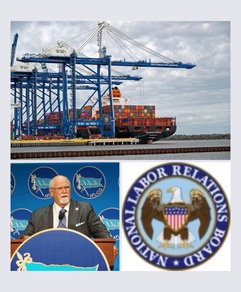ILA and President Harold Daggett Achieve Victory In Right To Sue Employers Who Fail To Keep Contractual Pledges; National Labor Relations Board Rules ILA Suit To Win Jobs To Enforce its Contract In Charleston, SC Is Lawful and Can Move Forward

NORTH BERGEN, NJ – (December 22, 2022). In a major victory yesterday that benefits the ILA and validates ILA President Harold Daggett’s argument that all new work at ILA ports must go to the ILA, the National Labor Relations Board (NLRB) sided with the ILA against USMX in a case involving a newly built terminal in the Port of Charleston, South Carolina. The Board ruled that the ILA has the right to sue its employers if they fail to keep the promises that they made in the USMX-ILA Master Contract.
“Today, ILA workers scored a great victory to protect their work jurisdiction while creating the potential to bring hundreds of good paying jobs to ILA-represented workers in the Port of Charleston, SC and elsewhere,” said ILA International President Harold Daggett. “It’s been a long and tough battle, but we have achieved victory for ILA represented workers, upheld our Master Contact, and protected our members’ work jurisdiction.”
In 2021 the ILA sued USMX, Hapag-Lloyd, and OOCL for millions of dollars for breach of the Master Contract because those two carriers had used a newly built container terminal that did not hire Master Contract workers represented by the ILA for all Master Contract work. Instead, that terminal used many workers from outside the ILA’s bargaining unit to perform Master Contract work.
The Master Contract has always had clear language that any carrier transporting containerized cargo to or from a Master Contract port must use only those marine terminals that employ Master Contract workers represented by the ILA. If any carrier violates this provision of the contract, then the ILA is entitled to money damages. The purpose of this language has been to preserve Master Contract work for the Master Contract workers who are represented by the ILA.
In Charleston. South Carolina, however, the Master Contract carriers have historically been allowed to use terminals that do not employ all workers covered by the Master Contract for all Master Contract work. So in 2012, the ILA got USMX and the carriers to agree to amend the Master Contract to promise that they would not utilize any newly built marine terminals that did not hire Master Contract workers for all Master Contract work—whether the new terminal was built in Charleston or any other port.
However, when a new container terminal was built in South Carolina in 2020, it was not using Master Contract workers for all Master Contract work, but Hapag-Lloyd and OOCL brought their containers to the new terminal anyhow—a clear violation of their promises in the Master Contract. So the ILA sued OOCL, Hapag-Lloyd and USMX for the money damages in court in New Jersey.
Rather than admitting that they had broken their promise to the ILA and paying the damages as agreed, USMX instead ran to the NLRB and complained that the ILA’s lawsuit violated federal labor law. Initially, USMX was able to convince an administrative law judge in the local region to side with them, but the ILA appealed the dispute to the actual Board in Washington, and after reviewing the briefs, the Board ruled that the ILA had a first amendment right to file the lawsuit in order to enforce the terms of the Master Contract, and such a lawsuit could not be in violation of labor law. The Board also ruled that the key provisions of the Master Contract were lawful agreements to preserve the work of the unit represented by the ILA and therefore a lawsuit to enforce a lawful agreement was also lawful. The Board also recognized that the Master Contract is a coastwide contract with a coastwide bargaining unit, and therefore any work-preservation agreement must be enforceable coastwide in order to be effective.
The ILA is pleased that the Board agreed that the ILA has both the right and the duty to fight to preserve Master Contract work for Master Contract workers coastwide. The ILA will continue this fight if USMX tries to appeal to an appeals court.
